Archive for category 2016 Presidential Race
Russia Elects A US President
Posted by Joshua Sharf in 2016 Presidential Race, History, National Politics on March 7th, 2017
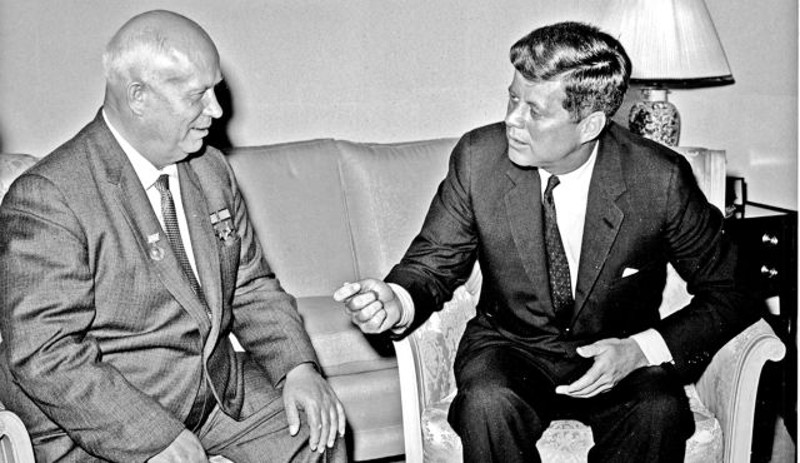 In 1960. At least that’s what Khrushchev thought.
In 1960. At least that’s what Khrushchev thought.
Khrushchev took a particularly keen interest in the 1960 US presidential election. Having engaged Nixon in the famous 1959 “Kitchen Debate” while on tour in the US, he became convinced that the firm anti-Communist would be impossible to do business with. He determined to help elect whoever the Democratic nominee was.
First, he tried to convince Adlai Stevenson to run again. Stevenson declined to openly seek a third straight nomination, mostly out of pride and a desire to be asked rather than have to ask. But he was certainly not about to be goaded into it by the Soviets.
Then, when John F. Kennedy became the nominee, Khrushchev tried to intervene in the election on his side. Quoting from Dan Carlin’s podcast on the Cuban Missile Crisis:
In the book Inside the Kremlin’s Cold War by Vladislav Zubok and Constantine Pleshakov, it’s interesting to read exactly how much Khrushchev was hoping Kennedy would become the president. But not because he thought he was weak, but because he thought he might be another Franklin Roosevelt, someone who could reach out and have another relationship the way Stalin’s and Roosevelt’s relationship was seen to be.
Khrushchev apparently did everything he could to help Kennedy get elected. He told KGB officers in Washington to analyze the situation, and if there was anything they could do diplomatically or with propaganda to help, to do it. He called Kennedy, ‘his president’ after he was elected, and told Kennedy at the first eye-to-eye meeting they every had, ‘I got you elected.’
Zubok and Pleshakov go on (p. 238) to detail that they were rebuffed when they rather clumsily tried to approach Robert F. Kennedy directly. However,
In the end, Khrushchev did influence the U.S. presidential elections by his belligerent rhetoric, as well as by demonstrating that a constructive U.S. – Soviet dialogue would be impossible so long as Eisenhower or Nixon remained in the White House. Twenty years before the revolutionary leadership of the Islamic Republic of Iran used American hostages to influence a U.S. presidential campaign, Khrushchev did the same by holding captive two pilots of the U.S. reconnaissance plane RB-47, shot down in July 1960 over the Soviet North. Along with fears of the “missile gap,” Kennedy successfully exploited the issue of the captive pilots in his barbs against the Eisenhower-Nixon administration.
Correctly or incorrectly, Khrushchev believed this was a decisive factor in the elections. From his memoirs, Khrushchev Remembers, page 458, he details how he mentioned this to Kennedy at the Vienna summit:
By this time President Kennedy was in the White House. Not long before the events in Berlin came to a head, I met Kennedy in Vienna. He impressed me as a better statesman than Eisenhower. Kennedy had a precisely formulated opinion on every subject. I joked with him that we had cast the deciding ballot in his election to the Presidency over that son-of-a-bitch Richard Nixon. When he asked me what I meant, I explained that by waiting to release the U-2 pilot Gary Powers until after the American election, we kept Nixon from being able to claim that he could deal with the Russians; out ploy made a difference of at least half a million votes, which gave Kennedy the edge he needed.
Of course, at the time, nobody accused RFK or JFK of actually colluding with the Soviets to ensure JFK’s election. (That would have to wait for another election, and another Kennedy.)
Trump’s Transition Team Takes Shape
Posted by Joshua Sharf in 2016 Presidential Race, National Politics on November 10th, 2016
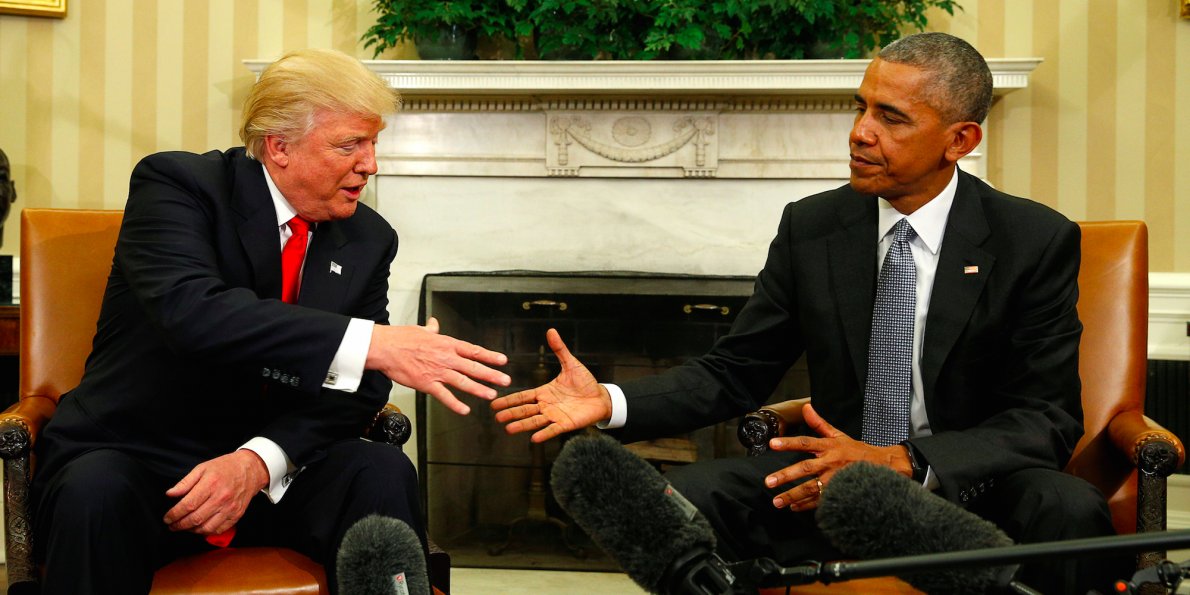 In my copious free time, I’ve been looking over the names on the “Trump Transition Team,” (and there’s a phrase that, 48 hours ago, would have free-associated with, “medical marijuana”) gleaned from an org chart obtained by the AP.
In my copious free time, I’ve been looking over the names on the “Trump Transition Team,” (and there’s a phrase that, 48 hours ago, would have free-associated with, “medical marijuana”) gleaned from an org chart obtained by the AP.
Below the line, I’ve reproduced the chart with some quick links to bios, background stories, and a few comments of my own. Some of the names are common, so I wasn’t able to find out something about everyone.
This will come as a surprise to some, a disappointment to others, and no doubt the City of Shushan will be perplexed, but from the spot-checks I’ve made, these are not the choices of a liberal New York Democrat, a maniac, or a pyromaniac.
Some are quite conservative, some are libertarian-leaning, and a few could probably by fairly characterized as part of the swamp Trump promised to drain. In includes insiders, outsiders, experts, a major fundraiser, and even a few lobbyists.
Now, understand that this is the transition team, not the cabinet or agency appointments. Part of the job of the transition team is to ease the way for those appointments and make personnel and policy recommendations, but not always fill those positions themselves.
It’s worth remembering that a large number of the Never Trumpers came from the foreign policy ranks. Some have extended Never Trump to mean that they wouldn’t work in a Trump administration. That seems to me to be a recklessly irresponsible position to take. Trump is certainly inexperienced in foreign policy. If he is truly as wrong-headed and unsuited for the position as they think – and I’m among those who said he was unfit for the job – he’s still going to be President for four years. By their own reasoning they’d be doing a great service to the country by serving in his administration, and helping to save us from the worst national security consequences of his governance.
Contrast that with Arthur Brooks at the American Enterprise Institute. Out of 17 candidates, Trump had to be Brooks’s 18th choice. But at least three of the names here have ties to AEI. Brooks didn’t burn bridges, didn’t put his organization at risk over an electoral decision, and now is in a position to influence policy for the better.
Nevertheless, this gives them considerable leverage in setting the tone, approach, and priorities for the new administration. On the whole, I see not much to be scared of, a little to be wary of, and a lot to be hopeful about.
You know, there’s a glimmer of hope that this just might work out.
- Ron Nicol – Director of Agency Action
- Defense – Keith Kellogg
- Kellogg was one of the first military men sent into Iraq after the invasion, and he eventually went to work for CACI, a large defense contractor, as head of their R&D divison. Make no mistake – his job wasn’t to head reasearch, it was to help get contracts.
- Defense – Mira Ricardel
- Mira Ricardel is an interesting choice for Defense. She was at Boeing for about 10 years, and recently wrote a piece for The Hill about the need for a comprehensive missile defense strategy.
- VA – Ret. General Michael Meese
- National Security – Mike Rogers
A lot of us were surprised and disappointed when Mike Rogers left the House for a career in media. He’s the former head of the House Intelligence Committee, and a very welcome addition to Trump’s team. - State – Jim Carafano
Carafano is a national security guy, less than a diplomacy guy, and may be a bit of a round peg in a square hole here. One of his major concerns has been the national security implications of our porous southern border. - DHS – Cindy Hayden
- Intel – Ron Burgess
Former DDNI and head of DIA, so some serious experience chops here. - NSC – Matthew Freedman
Reported association with Manafort is of some concern - Justice – Kevin O’Connor
- Economics – Bill Walton, David Malpass
Walton also has a free market-oriented, generally pro-freedom site here.- Treasury – David Malpass
David Malpass (like Ebell, educated at Colorado College), has prior experience at Treasury under Reagan and GHW Bush, and is on the record opposing easy money as a substitute for pro-growth policies. - Commerce – Ray Washburne
Dallas developer, Trump Finance Committee Chair, former RNC & Chris Christie finance chairman - USTR – Dan DiMicco
Hostile to TPP, and has written extensively about the need to start actually making things again - Indep. Agencies – Paul Atkins
Former SEC Commissioner, with appropriate hostility to Dodd-Frank. Also a scholar at AEI - SBA – Christine Toretti
Oil industry exec from Pennsylvania, someone who embodies everything feminists say they like, except for the whole motherhood-and-Republican thing. Longstanding ties to the Pennsylvania party. - FCC – Jeff Eisenach
Jeffrey Eisenach is at AEI, and his expertise seems like an excellent fit for FCC - SSA – Michael Korbey
- Treasury – David Malpass
- Domestic – Ken Blackwell
“Since his days mixing it up inside the home-state GOP, Blackwell has taken on an increasingly visible national role. He serves on the boards of the National Rifle Association and conservative Club for Growth.” I remember when Blackwell ran for Governor of Ohio. Liked him then, like him now.- DOE/NRC – Mike McKenna
Also an energy lobbyist. - EPA – Myron Ebell
Ebell is at CEI, and famously hostile to Climate Change orthodoxy, and was the source for Trump’s comment that climate change was an scam developed to hobble us economically. For the record, I think he’s probably right. - Labor – Steve Hart
Major, high-powered lobbyist; I don’t know much else about him - HHS – Andrew Bremberg
“McConnell! McConnell!” I hear you cry, but he also worked on Scott Walker’s campaign for a while. He had hoped to help Romney repeal Obamacare - DOT – Shirley Ybarra
Ybarra has been involved in transportation issues for years, and has found a home writing for Reason - Education – Williamson Evers / J. Manning
Evers is with Hoover, a strong proponent of choice and innovation and opponent of Common Core - Interior – David Bernhardt
Based out here in Colorado, a lobbyist and attorney representing clients on land-use issues. Let’s see if he’s willing to recommend people who want to devolve some public land back to the states. - Agriculture – Michael Torrey
Lobbyist specializing in Agriculture
- DOE/NRC – Mike McKenna
- Mgmt/Budget – Ed Meese (yes, that Ed Meese) / Kay Coles James
- OMB – P. Winfree / L. Springer
Winfree is with the Heritage Foundation, as a budgetary expert - OPM – Kay Coles James
Associated with AEI and has worked with OMB before
- OMB – P. Winfree / L. Springer
- Agency Tranform & Innovation – Beth Kaufman / Jonathan Beck
- Defense – Keith Kellogg
From the Convention Floor
Posted by Joshua Sharf in 2016 Presidential Race, Political History on June 15th, 2016
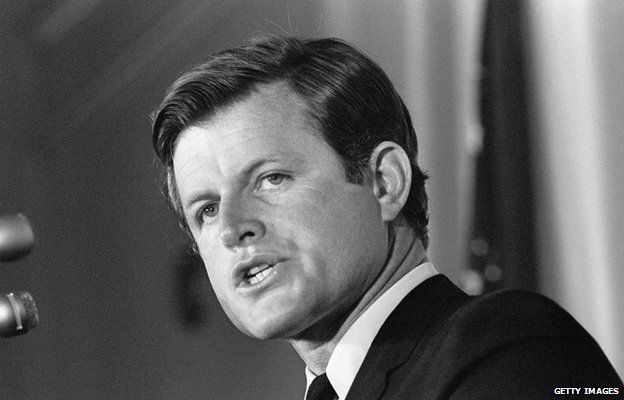 Almost forgotten in the other storylines of the 1968 Democratic Convention was the two-hour boomlet (or so it seemed) to run Ted Kennedy in place of his assassinated brother, Robert. Theodore White recounts the moment (p. 351-354), noting that it was briefer, more fleeting, and far less likely than the press coverage that Tuesday evening made it seem. Kennedy would never allow himself to be seen actively courting such a movement, and the forces needed to make it happen were too unlikely as allies.
Almost forgotten in the other storylines of the 1968 Democratic Convention was the two-hour boomlet (or so it seemed) to run Ted Kennedy in place of his assassinated brother, Robert. Theodore White recounts the moment (p. 351-354), noting that it was briefer, more fleeting, and far less likely than the press coverage that Tuesday evening made it seem. Kennedy would never allow himself to be seen actively courting such a movement, and the forces needed to make it happen were too unlikely as allies.
He then delivers, in a footnote, his damning indictment of the press and its coverage of that non-development:
It has always seemed to me unfair to criticize the floor reporters of television for behavior forced on them by the commercial competition of their networks. To report a convention from the floor, the networks choose their best political correspondents…Turned loose in the compact space of the convention floor, with dozens of Governors and Senators, scores of Congressmen, political bosses, old contacts and political freshmen, they are as happy as dogs in a meat market. No one can escape their cameras and microphones; nor do many delegates want to escape a televised interview…
Delegates thus lived in an echo chamber; and so, as a matter of fact, did the reporters themselves. Floor reporters are turned loose on a chase, and the director in the control room calls the course, the story-line they must chase. On the convention floor, someone can always be found to say anything, and it remains only for good direction to put the fragments together in dramatic form. Neither the delegates nor reporters can be blamed; only the mechanism and its programming, which calls for competitive and rival drama to hold audience.
If the script that night had called for the discovery and dissemination of a Southern revolt, or the candidacy of Lester Maddox, the reporters could have delivered that to the nation, too – all carved out of truth, from the lips of authentic and honest men on the floor.
This is something to bear in mind as we head towards Cleveland, with Trump’s poll numbers beginning to tank and his fundraising outlook getting bleaker. There will be reports of incipient revolt, of blocs of delegates withholding their support, of Rubio and Kasich (who retain control over their delegates) trying to organize Cruz delegates to deny Trump the nomination on the first ballot.
With the increasing likelihood of violent events taking place outside the hall, and the necessity of word-of-mouth organization of the delegate inside the hall, things have changed less than people think, even with the advent of social media. We’ve seen how those media are highly susceptible to the manipulation of a very few influential practitioners with many followers.
Add to that the fact that, unlike in Chicago in 1968, the press will be actively looking for stories designed to make the Republicans look bad. Certainly, the press’s favorite story-line already is the failure of the party to unite. They will find ample fodder for that claim, and any other they decide they need on Monday, Tuesday, or Wednesday evening.
Caveat emptor.
The Risks of Committing Too Early
Posted by Joshua Sharf in 2016 Presidential Race, Israel on June 9th, 2016
All expected [Chicago Mayor Richard Daley] to be with Humphrey; but his silence reminded politicians of old-time Boss Richard Croker of New York. Once, at one of Tammany’s boisterous Fourth of July parties, when everyone else broke into singing “The Star-Spangled Banner,” an associate noticed that Boss Croker was not singing, and asked why. “He doesn’t want to commit himself,” growled a crony.
— Theodore H White, The Making of the President 1968
In the aftermath of Wednesday’s terrorist murders in Tel Aviv, each of the campaigns of the presumptive nominees issued a statement. They each read, in tone, about as you would expect them to read, but the content is very different.
Hillary Clinton’s reads like a fairy standard pro-forma press release from the State Department. It reads, in full:
I condemn the heinous terrorist attack in Tel Aviv today. I send my deepest condolences to the families of those killed and I will continue to pray for the wounded. I stand in solidarity with the Israeli people in the face of these ongoing threats, and in unwavering support of the country’s right to defend itself. Israel’s security must remain non-negotiable.
For comparison, here’s the actual standard pro-forma press release from the State Department:
The United States condemns today’s horrific terrorist attack in Tel Aviv in the strongest possible terms. We extend our deepest condolences to the families of those killed and our hopes for a quick recovery for those wounded. These cowardly attacks against innocent civilians can never be justified. We are in touch with Israeli authorities to express our support and concern.
I condemn, in the strongest possible terms, the outrageous terrorist shootings that took the lives of at least four innocent civilians and wounded at least twenty others in Tel Aviv yesterday.
The Israeli security forces’ investigation is ongoing, but some facts have already emerged — and they are grim.
Just as fast as the condolences arrive from the civilized world is the praise arising out of the uncivilized one. Hamas praised the attack, calling the attackers “heroes.” Reports out of Hebron indicate that residents of the terrorists’ hometown lit up the night sky with celebratory fireworks. One Palestinian “news organization” even referred to the shootings, in which the assailants dressed up as observant Jews, as a “Ramadan treat.” The leader of Hamas called the injured terrorist a “hero.” How despicable!
The American people stand strong with the people of Israel, who have suffered far too long from terrorism. Israel’s security is a matter of paramount importance to me and the American people.
We understand all too well the unspeakable horror that terrorism unleashes. To address it — and address it we must! — we must recognize the parallel horror of the culture of religious hatred that permeates many Palestinian quarters. From schools that indoctrinate toddlers to grow up to kill Israelis to the daily menu of hate that spews forth from various “news organizations,” change is long overdue in the Palestinian territories.
Let us begin the arduous task of creating a future where peace can take root and terror finds no refuge.
I express my deepest condolences to the families of the four Israelis who were murdered, as well as my wishes for a speedy recovery to the wounded.
There’s nothing pro-forma about that, and it indeed reads just like something that Trump would say or tweet, down to the trademark “How despicable!” It places blame directly on – get this – the terrorists and the people who encourage them, rather than on Israel or “the occupation,” and while it mentions Hamas by name, it refers to “the Palestinian territories” all together, implicitly including the PA and Abbas as guilty parties.
If you’re a supporter of Israel, it’s almost impossible to imagine a statement more sympathetic to Israel, more discouraging to the deceitful Palestinian leadership, or with greater moral clarity.
The problem, of course, is that it’s coming from Donald Trump, who’s been more than a little malleable in his public statements. The question about any statement issued by Trump isn’t whether it’s good or bad, but whether he’ll even admit tomorrow that he said it. It’s usually prudent to at least apply Trump’s own 25% contractor discount.
What’s to be learned here isn’t much about either campaign. It’s about the dangers of committing too early to a side without bothering to extract concessions, which is what the #NeverTrumpers have done. As I’ve written before, there are excellent reasons for voting for Hillary, or voting for Trump, or voting for some third or fourth or fifth-party candidate. Reasonable people can come to different conclusions about the result of that calculation. (My own mind isn’t made up, and it’s got a complex calculation with only one output: what’s the best scenario for Constitutional conservatism surviving as an organized political force by 2020?)
It’s not just how someone eventually votes, it’s what they do with their leverage before they vote. The #NeverTrumpers have effectively thrown away all of that leverage, insisting that it’s better if Clinton is elected than Trump, leaving her no incentive to try to win their votes. What you end up with is statements like the one above, which say absolutely nothing, and could have been issued by an administration whose actions have been unprecedentedly hostile to the Jewish State. It’s worse than a crime, it’s a blunder, because it’s exactly the same mistake we see the Jewish community at large as having made for generations.
In a complex year like this one, like 1968 in many ways, such a simple calculation leaves a lot out: how far can Hillary move to being pro-Israel without losing even more voters to the openly Israel-hostile Bernie? does at least saying #NeverTrump put more pressure on delegates at the RNC to ditch him for a better candidate? But I don’t see where any of the #NeverTrumpers are really using that as a negotiating ploy, they really mean it, and since they’ve persuaded everyone that they really mean it, Hillary has no reason to do more than she’s done, letting everyone read into her statements whatever they want. I’m sure some conservative, pro-Israel #NeverTrumpers will persuade themselves that this tepid bland press release actually represents something acceptable or even laudable.
But you don’t have to be Boss Croker to see that by holding out, by at least making Clinton work a little bit for your vote or half-vote, you at least have the chance to move her in a more pro-Israel direction.
Aiming To Misbehave
Posted by Joshua Sharf in 2016 Presidential Race on June 2nd, 2016
 Ever since Donald Trump won Indiana, those seeking to nominate a non-Don have been hoping to find a way to stave off his nomination at the convention in Cleveland.
Ever since Donald Trump won Indiana, those seeking to nominate a non-Don have been hoping to find a way to stave off his nomination at the convention in Cleveland.
Mostly, these ideas entail finding some way to get enough delegates to defect from Trump – either by voting for someone else or by abstaining – to deny him a first-ballot win. It’s no secret that many delegates pledged to Trump on the first few ballots are actually Cruz supporters, so the belief is that Trump will never be stronger than on that first ballot.
A long-time member of the Rules Committee, Curly Haugland, argues in his book, Unbound, that by law and national party rules, all delegates to the convention are not, in fact, bound. This is probably true functionally, but it will take some persuading, and a great deal of that persuading will probably take the form of rules fights, which will happen in both the Rules Committee and on the floor.
While there have been no confirmed reports of an organized attempt to nominate Cruz in place of Trump, rumors have been intensifying.
This is an exceedingly dangerous game that Cruz and his delegates may be playing.
I was there for the 2012 Denver Republican County Assembly, a descent into rules-chaos which few of the delegates understood, orchestrated by many in the Ron Paul faction. Rightly or wrongly, they felt themselves greatly aggrieved by the party “establishment,” and didn’t have much investment in playing by rules they felt guaranteed them to lose.
The Denver Post’s Spot blog was still writing about it weeks later.
This can be done right, but it will take preparation.
If there’s a productive way of getting another nominee at the convention – and if Cruz delegates are willing to settle for someone other than Cruz in order to make that happen – then it could be beneficial. This will mean a simple rules fight that everyone can understand, and that everyone can understand what it means.
I remember the 1980 Democratic Convention, when the Ted Kennedy forces wanted to unbind the delegates on the first ballot. Everyone understood what that meant, and that if they won, it would likely lead to Kennedy being the nominee.
The motion lost, as did the renominated President Carter in the fall, but nobody walked away wondering what they had just seen, or feeling that someone had tried to pull a fast one.
If instead, it’s a floor fight that nobody watching on TV at home understands, that just ends up dividing the party further and using floor speeches to attack party leadership and its institutions in the guise of “The Establishment,” then it won’t help in the long run or the short run.
Doing things that way, tying the convention floor up in knots without a clear path to victory, and attacking the party as corrupt or untrustworthy, it will remind Republicans of the Cruz they distrusted and disliked in the first place, the one who drags the party into losing battles and then blames everyone else for his strategic miscalculations, the one who wanted to be Robespierre, but failed to account for Trump’s Napoleon.
Moreover, those optics are a trap for Republicans. Democrats are planning disruptive, possibly violent protests outside the hall. Combined with chaos on the convention floor, it would cement the impression among voters of a party in disarray, a nominee being crowned on bayonets. It would be the Democrats in 1968 in Chicago all over again.
It’s possible that this is ok with Cruz, and ok with a lot of his supporters, who want to be seen as the leaders of the Conservatives in Exile within the party. They figure that after Trump loses, they’ll be in a position to seize the party and nominate Cruz; their model is Reagan in 1976, or Goldwater in 1960. But Ford didn’t enter the ’76 convention with enough delegates, and Goldwater’s tactics in ’64 left the party bitterly divided.
If the Cruz people want to do this right, they’ll start telegraphing their intent publicly well beforehand. They’ll explain what it is they want to do and why. They’ll come up with a plausible reason – John Fund has suggested the tax returns could provide one. They’ll do so with a minimum of personal attacks and rancor. If they’re able to succeed in pushing it to further ballots, they’ll be prepared for the possibility that Cruz can’t get a majority, either, and will support some other non-Don for the nomination.
That’s if they care about doing this right.
Sulla vs. Marius
Posted by Joshua Sharf in 2016 Presidential Race, National Politics on May 11th, 2016

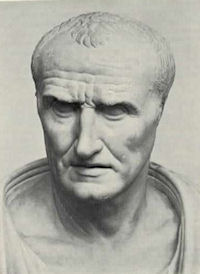
Or Trump vs. Clinton, take your pick.
Several decades before the Senate got stabby with Caesar, there were Sulla and Marius. Sulla is pictured on the left, and that’s Marius there on the right, looking like Lyndon Johnson.
I don’t have enough time to go into all the details here. For those, you should go to Dan Carlin’s Hardcore History series on the Death Throes of the Roman Republic. The title of that should give you some clue of where we’re headed with this post.
For our purposes, it’s enough to know this highly simplified version. Gaius Marius was a populist general, hyper-ambitious, who managed to get himself elected Consul seven times, at a time when Consul was a strictly term-limited position: once in your lifetime, and that was it. He posed as a champion of the people, while reworking the Roman command structure so that his legions were personally loyal to him, as opposed to the Senate as an institution. In doing all of this, he severely upended Roman political institutions, which were having trouble enough functioning as it was, and mostly in the service of his own ambitions.
Sulla, among others, was displeased with this. If Gaius was a corrupt, self-serving general, Sulla truly saw himself as a Roman patriot, but a particularly ruthless and brutal one.
In his effort to restore the traditional order, and traditional Roman virtues, reduce the powers of the Consul, restore the primacy of the Senate, and return politics to “normal” functioning, he engaged in a series of political and military battles with Marius, eventually ousting him. Upon arriving in Rome, he addressed the Senate in the Forum, speaking over the screams of those his men were beheading just yards away. In the need to sweep away the entrenched powers, he cleansed Roman politics in blood, so much so that when he eventually retired from public life, he was able to walk about Rome without a bodyguard, having killed everyone who could possible pose a threat.
I have been saying for several months now that the prospect of a Trump vs. Clinton matchup – which I frankly never thought would happen – would let me know exactly how a citizen of Rome, circa 80 BCE, would have felt, having to choose between Marius and Sulla.
The analogs aren’t perfect, but if forced to map one contest onto the other, I think I’d make Trump Sulla and Clinton Marius. Clinton has Marius’s ambition and corruption. Trump has Sulla’s brutality (though not his courage) and his appeal is largely nostalgic. Marius had a party; while Sulla had followers, he was mostly a one-off.
None of this bodes well for us, but it should provide a particular object lesson for those conservatives and Republicans who, in their earnest and right-minded desire to have nothing to do with Trump, are in the process of convincing themselves that Clinton would be bad, but not all that bad.
Let’s be perfectly clear – a Clinton presidency would be a catastrophe for freedom and liberty, for actual traditional American values.
Clinton is not only personally corrupt and mendacious, she has managed to harness the institutions of government to her personal ambition. She has never drawn, in her mind, a clear line between herself, her campaigns, and the public offices she has held. It was the Clintons who put a price tag on the Lincoln Bedroom, and continued to run a likely illegal foundation while she was a Senator and Secretary of State, using the State Department to arrange thank yous to foreign governments who had contributed to the foundation. In her zeal to conceal these activities from public scrutiny, she set up a home-brew email server so she could conveniently delete tens of thousands of emails, depriving investigators of the starting end of the thread when they tried to recover them. In doing so, she put the nation’s most sensitive secrets into the hands of hostile foreign governments, likely getting overseas operatives killed.
This is not merely power for the sake of wealth, it’s wealth for the sake of more power. Clinton is not, a some conservatives are telling themselves, a stable centrist. She is a leftist ideologue leading an increasingly ideologically leftist party. What would be her predecessor in office, the current president, has managed to weaponize the IRS and the Department of Justice against political opponents. Clinton would revise and extend that abuse to any agency with police powers or powers of enforcement.
She would be relentless in her pursuit of a functional one-party state. And she might well be able to achieve it.
Over the last several decades, as political power has shifted away from the states towards DC, and away from Congress towards the Presidency. Democrats have been increasing their base in the Electoral College at the same time. Which explains why, even as Republicans have been cleaning up at the state and local levels, and have been ascendant in Congress, those victories have seemed increasingly hollow.
And she would leave no respite at the state or local levels. The are currently test-piloting the use of state Attorneys General in California, New York, and the Virgin Islands to criminalize political opposition. Likewise, the flim-flam prosecution of Texas Gov. Rick Perry and the John Doe investigation in Wisconsin were designed to hamper leading Republican presidential candidacies at the local level.
Her Supreme Court picks, who see the Court not as a third branch of government but an enforcement mechanism for the Left, would do nothing to stop it.
In politics, it is organization above all that matters. Those trying to organize opposition into cohesive, coherent, cross-state operations capable of resisting federal overreach or effectively winning electoral or legislative battles would find themselves on the receiving end of audits, OSHA visits, and Justice Department investigations.
Fortunes would be confiscated and distributed to leftist, Democrat-supporting political organizations. Donor lists would be demanded and conveniently leaked. This, too, has already been test-piloted by the current administration.
Hillary Clinton would use all of these tactics and more to pursue her political and ideological opponents to the ends of the earth. After four or eight years of her, following eight years of Obama, that would mean an entire generation had grown up thinking this was how things were done.
In all of this, not one senior member of her party has objected. Indeed, they have either denied that any such abuses took place, or denied that openly political prosecutions are abuses at all.
Make no mistake, Trump is a danger all his own. He is more chaotic, less predictable, than Clinton. If Clinton thinks the laws don’t apply to her, Trump sometimes seems to think no rules apply to him at all. He might very well use all the same tools against his political opponents that Hillary would. I strongly suspect that those who think they can control him once in office are in for a rude surprise. His only saving graces appear to be that his patriotism can’t be in doubt, and that the Republican party is just a vehicle for him, rather than an ideological stronghold.
In Sulla’s immediate aftermath, all seemed to be returned to normal. Of course, it wasn’t. As Carlin points out, in using his army to forcibly restore a political order that Romans had lost the will to maintain, he didn’t really put things aright; he just provided a road map for the next strongman who wanted to seize power. (Ironically, against his better judgment, he spared one of Marius’s party – one Julius Caesar. “You fear Marius. I tell you this one contains a thousand Mariuses.” But he spared him anyway.)
Our salvation, if it comes, will not come from anyone we elect President. Even a Ted Cruz, who despite his deep personality flaws, is plainly in love with the Constitution and confined his considerable ambition squarely within its constraints, even a Ted Cruz wouldn’t be able to restore Americans’ faith in a representative system of limited government all by himself. Just as the Romans remained stuck with a fragile system that begged for a strong executive, our own Congress seems uninterested in governing, more interested in running against an executive it won’t rein in.
The choice, therefore, is simply this – which candidate provides the best chance for liberty and freedom, representative government, limited government, to survive as living political movements and ideas in 2020 or 2024? I am, as well, perfectly willing to entertain as a strategy helping to elect one of them, and immediately setting about to undermine him or her, in order to give American more wriggle-room.
I’ll be damned if I know yet, but let’s not fool ourselves about what’s at stake.
What If There’s an Open Convention?
Posted by Joshua Sharf in 2016 Presidential Race on March 3rd, 2016
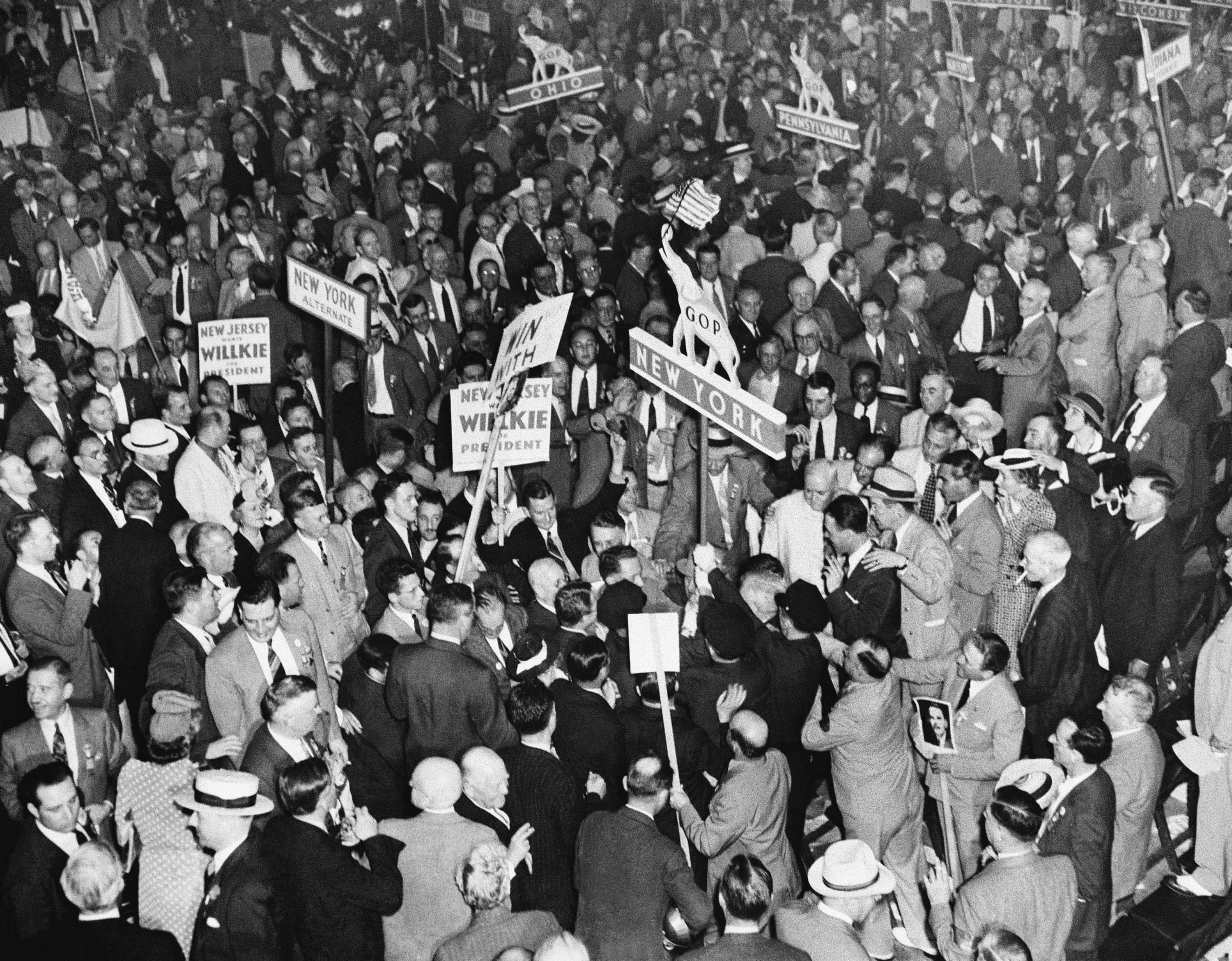 With the inconclusive results from Super Tuesday, and the possibility that Marco Rubio captures a significant number of delegates on the Second Super Tuesday, March 15, there is increasing talk of a convention where none of the three major candidates arrives in Cleveland with enough delegates to secure the nomination.
With the inconclusive results from Super Tuesday, and the possibility that Marco Rubio captures a significant number of delegates on the Second Super Tuesday, March 15, there is increasing talk of a convention where none of the three major candidates arrives in Cleveland with enough delegates to secure the nomination.
In the past, this was known as a “brokered convention,” but with the demise of anything representing a serious party power structure, there are no brokers, and the term “open convention” has taken hold.
Such a scenario has become Marco Rubio’s best shot at the nomination, assuming that he does well in the upcoming states, and is still viable as a candidate.
Reports that Rubio is now pursuing this as his primary strategy have prompted faux outrage from some quarters, decrying the “arrogance” of such a strategy that would “steal” the nomination from Trump.
Rubio has successfully head-faked us twice before, and that should be taken into account when appraising the value of these reports. But for the sake of discussion, let’s assume they’re true.
In my opinion, this is a common-sense strategy for someone who wants to win, and who believes that he can force an open convention. Prior to the modern era, open conventions were the norm, because primaries and caucuses with reported results were so few and far-between. Neither NY Gov. Thomas Dewey in 1948, nor Gen. Dwight Eisenhower in 1952 was nominated on the first ballot. Wendell Willkie was nominated on the 6th ballot in 1940. I’m sure there’s a history of the 10-ballot 1920 nominating convention either written, or waiting to be written.
The last time this happened in a Republican convention was 1976, when Reagan narrowly failed to unhorse incumbent President Gerald Ford.
Less remembered was the 1980 Democratic race, where President Carter had enough delegates to secure renomination, but Senator Ted Kennedy hoped that an increasing loss of confidence in Carter would be enough to pass a floor motion to unbind the delegates. The procedural vote failed, but that outcome was by no means a foregone conclusion, and I remember watching it live.
I don’t see why this strategy is any more arrogant or cynical than Ted Cruz’s overt appeasement of the Trump campaign, trying to transform the race from the presumed “lanes” into a pre-Trump semifinal. Cruz and his supporters have obviously fed Trump support, hoping to use him as a blocking back. Over time, this has transformed into outright appeasement, an “eat me last” strategy that seeks to make Cruz the only acceptable alternative to a Trumpmonster he assisted. In the process, they have helped Trump to severely damage many of the institutions they had hoped to inherit.
The Trump people, and the Cruz people who want to paint Rubio as exceptionally opportunistic, have taken to talking about the “will of the people,” always a doleful sign, but exceptionally so in a Republican primary.
I don’t believe in “the will of the people.” I believe in decisions, candidates, and nominees. I believe in ballots, and delegates, and delegates who cast ballots in order to make decisions and choose among candidates for nominees. You mark a ballot, and if you do it wrong, it’s not my job to figure out which of the stray marks, notes, arrows, corrections, and erasures indicate what it was you were trying to do. In mathematics, my views may vacillate between constructivism and platonism, but in politics, I am a strict, unyielding formalist.
Likewise, the rule is that you only get the nomination if you get 50% + 1 of the delegates. If you don’t get 50% + 1 of the delegates, then by definition it was not “the will of the people” that you be nominated.
If there’s an open convention, arms will be twisted, deals will be made, principles will be pitched and abandoned, and someone will emerge with a majority on some ballot. If the candidate who walks in with the most, but not enough, doesn’t have a plan to win, then shame on him, but it’s his problem, not mine.
Welcome to the real world.
Haley Endorses Rubio
Posted by Joshua Sharf in 2016 Presidential Race, National Politics on February 17th, 2016
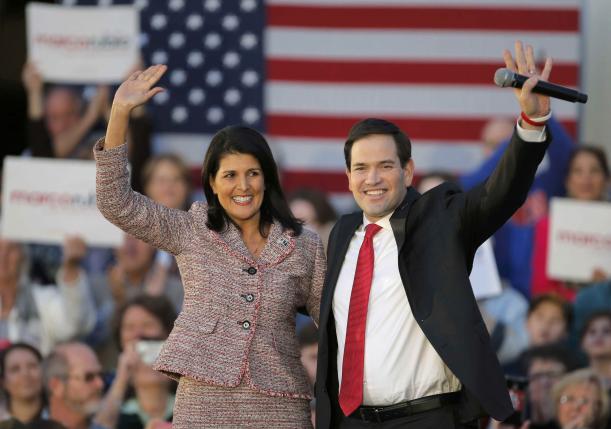 South Carolina Gov. Nikki Haley formally endorsed Sen. Marco Rubio for President this evening at a campaign rally. As has been pointed out, without the political machines they once had at their disposal, elected officials’ endorsements mean less than they used to. Still, this is not insignificant, and comes just a few days before South Carolina holds its primary.
South Carolina Gov. Nikki Haley formally endorsed Sen. Marco Rubio for President this evening at a campaign rally. As has been pointed out, without the political machines they once had at their disposal, elected officials’ endorsements mean less than they used to. Still, this is not insignificant, and comes just a few days before South Carolina holds its primary.
Trump has been leading there and will probably win, but this gives Rubio the inside edge on the alleged “establishment lane” there, and could even push him past Cruz for 2nd place.
The endorsement isn’t entirely unexpected. Haley’s State of the Union response angered many of the Trump and Cruz persuasion, for its emphasis on talking about people rather than policies, and its perceived softness on immigration. Personally, I thought the response was inspiring. The tenor of it was very similar to Rubio’s at his most effective. After she delivered it, I figured that she would be supporting Rubio, if not endorsing him.
[youtube width=”425″ height=”318″]https://www.youtube.com/watch?v=GS5zR7_7M5c[/youtube]
Guy Benson had a Facebook post earlier suggesting that Haley’s endorsement, and that of Sen. Tim Scott, a black Republican from that state, would send an important message to up-and-coming conservatives in the party. I think that’s true, but I think it’s possible that Benson has the cause and effect reversed here.
Haley and Scott were already prominent non-White conservative Republicans. The message of their endorsement for Rubio is not that conservative ideas know no color or sex, that they apply to everyone. That’s the message of Haley and Scott being elected statewide officials in the birthplace of secession, that it’s all right for blacks and other minorities to identify as conservatives and as Republicans.
They could have endorsed anyone, with the exception of Trump, and that wouldn’t have changed.
They obviously have been sold on conservatism’s message and policies, and believe that those are sellable to other minorities and to women. I’m sure that a large factor in their endorsement of Rubio is their belief that of the remaining candidates, he is the most effective communicator of those ideas to those groups.
[youtube width=”425″ height=”318″]https://www.youtube.com/watch?v=MLCgeRN_FAE[/youtube]
Rubio-Cruz, Cruz-Rubio
Posted by Joshua Sharf in 2016 Presidential Race on February 3rd, 2016
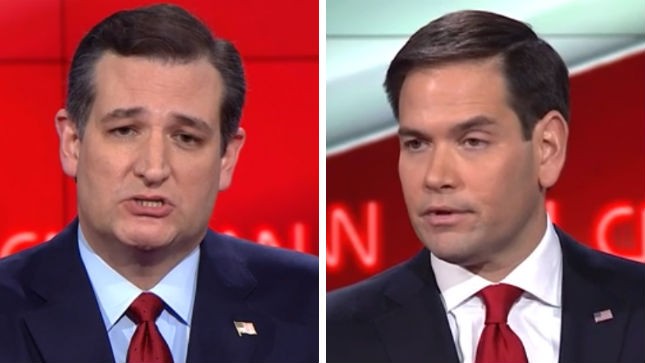 After the Iowa Caucuses, it increasingly appears to be a three-man race, with two serious candidates, Senators Ted Cruz and Marco Rubio. The supporters of each are passionate, sometimes bordering on the maniac, but that’s how it’s ever been in American politics.
After the Iowa Caucuses, it increasingly appears to be a three-man race, with two serious candidates, Senators Ted Cruz and Marco Rubio. The supporters of each are passionate, sometimes bordering on the maniac, but that’s how it’s ever been in American politics.
Sadly, Obama is living up to his promises of fundamental transformation, increasing both the role of the federal government in our day-to-day lives, making it harder for people to rise, making us more dependent on government programs, and hobbling us economically and overseas. He has corrupted everything he has touched, from the IRS to the Justice Department to Defense to the intelligence agencies. He has normalized the idea that it’s all right for the President of the United States to wield the power of the federal government against his political opponents. He will leave the next president with dangerously little room to maneuver – politically fiscally, militarily, and diplomatically – but maneuver he must.
Therefore, I’m less concerned with the antics of their supporters, and more concerned with how each would govern and would affect the long-term prospects for conservatism and the Republican party as its vehicle.
Both Cruz and Rubio present risks in terms of how they would govern, but each presents a different payoff, as well.
Rubio’s benefit is obvious: he’s plenty conservative, and his joyful optimism is better-positioned to bring both the party and the country back to civility, grow the conservative movement among urbanites, minorities, and women, and give us some base for a growing demographic majority rather than a shrinking one. He’s also more likely to hold onto those Congressional majorities, and keep the Democrats at bay at the state level for a while.
That last is more important than it seems. The prospects for a Republican who can win blue states like Minnesota can’t be overstated. As opposed to 1980, or even 1992, far fewer states have been in play at the Presidential level, over the last five elections. Pending the state-level results in 2020, and redistricting, the country risks hardening into relatively evenly-balanced partisan geographic blocks, something we haven’t seen since the mid-1800s.
Worse, while the Republicans have been sweeping everything in their path at the Congressional and state levels, the Democrats have enjoyed an enormous, although not always insurmountable, advantage in the Electoral College. This matters, because at the same time, they’ve been doing everything possible to unbalance our political processes so that winning the presidency is all that matters. A Republican president needs to undo the latter trend, but the results will only have staying power if he can also undo the electoral trend, as well.
The question is how much a President Rubio willing to do with that majority. He’s less likely to upset the apple cart of the established order, fundamentally rethink foreign policy, or take extraordinarily bold action early on. So is the potential reward going to come in time to save the Republic? That’s the risk that we think we’re getting with Rubio – a temperamentally conservative figure who will be more inclined to color inside the lines, turn the ship 15 degrees to starboard when it needs to go full reverse, and who will leave Washington basically unchanged in how it does business.
Cruz’s questions are different. He’s a higher-reward proposition. He’s much more likely to take bold, decisive conservative action, and much more likely to tell the “establishment,” whatever that means now, to pound sand, and thereby reorder how Washington works, if such is possible. David Goldman (Spengler) makes a compelling case that he’s the only one with the intellectual chops to rethink foreign policy in a constructive, strategic way.
However, if he’s higher-reward, he’s also much higher-risk. He will win by winning Romney’s states, plus Virginia, Florida, Ohio and then one other state – Nevada? New Mexico? Iowa? New Hampshire? Which means he won’t be coming in on a landslide of goodwill. Rather he’d win narrowly, and probably divisively. I’ve mentioned before how it’s hard to govern when everyone hates you, and as an additional handicap, he won’t have the press on his side, and he won’t have a particularly large reservoir of goodwill. When things start to go wrong – and things always go wrong – he won’t have very many friends to help him out without exacting a steep price.
Which leads to the internal contradiction of a Cruz Presidency. He’s a man committed to restoring the Constitutional order, which means governing through Congress and rolling back federal power. But he’s also a man who may find it impossible to make any of the domestic changes necessary, since that long-term change requires Congressional legislation. It means that a President Cruz, who longs to restore the Constitutional balance, may be stuck having to rely on the power of the executive, which both betrays that plan, and makes any structural fiscal or regulatory reform short-lived.
That’s the calculus facing Republican voters. It goes without saying that either Rubio or Cruz is a better bet for the country than corrupt Clinton or socialist Sanders. Imagine after eight years of either, after eight years of Obama, with a presidency increasingly comfortable with truly imperial powers. By then, it would be almost impossible to remember a time when the president couldn’t simply do whatever he or she wanted, or worse, when a citizen largely could do whatever he or she wanted.
Chronic Clinton Fatigue Disorder
Posted by Joshua Sharf in 2016 Presidential Race, National Politics on November 15th, 2015
Bernie Sanders is once again tired of hearing about Hillary’s emails.
Hillary Clinton hasn’t even been elected President, and she’s already returned Clinton Fatigue to Washington.
 Clinton Fatigue is that sense of exhaustion you get when trying to sort through the various lies, deceptions, evasions, inventions, and circumventions necessitated by various legal, ethical, and tangles, large and small, engaged in by the Clintons and their friends.
Clinton Fatigue is that sense of exhaustion you get when trying to sort through the various lies, deceptions, evasions, inventions, and circumventions necessitated by various legal, ethical, and tangles, large and small, engaged in by the Clintons and their friends.
Clinton Fatigue was one of the major contributing factors to the election of George W. Bush in 2000. People were exhausted by the sense that when they read the news coming out of Washington, they were forever walking in on a guilty child whose first reaction, like that of all guilty children, was to make something up. They had rejected a second term for George H.W. Bush in the 1992 elections, putting these very same Clintons in charge. Only eight years later, they elected his son of (nearly) the same name, so strong was the nostalgia for a time when the adults were in charge.
And now, with Madame Hillary holding no public office, only a candidate for President, it’s back.
It’s back in the lying about the lying about Benghazi. In the emails that Bernie Sander is already impatient to move on from, and the classified information that was on them. In the form that Hillary signed about the handling of classified info. In the tax returns that the Clinton Foundation can’t seem to get quite right. In the evidence that the Foundation had donors with business before the State Department.
It’s in the Hillary trying to turn herself into a hero of post-9/11 downtown reconstruction (where her daughter was not, in fact, jogging on that infamous day). For the record, because we cling to the hope that the record still matters, was how Hillary was received by the families of the NYPD and FDNY just a few weeks after 9/11:
[youtube]https://www.youtube.com/watch?v=7xa6BZXnGOQ[/youtube]
It’s in the lies she tells because she has to and the lies she tells because she wants to and the lies she tells because she just can’t help herself.
It’s in the “can’t remembers” when she doesn’t like the memory, or the lingering questions that never get answered but always have been.
It isn’t helped by the conspiricists who insist that Vince Foster was shot or that the MENA Airport was a major hub for drugs, murder, and mayhem all overseen by the then-governor but that doesn’t make the fatigue any less real.
The Clintons don’t just bring the Fatigue with them, they’re carriers. This time, it’s Huma Abedin who was personally put on the State Department payroll, signed a separation agreement which included the handling of classified information.
These lies, shadings, convenient memory lapses don’t just appear of their own accord. When someone compiles that kind of a record, it’s because of character.
She is, by turns, personally venal and politically vindictive. Does anyone doubt that she was selling access and potentially contracts the way she and her husband sold the Lincoln Bedroom a decade earlier? Does anyone think that she would shy away from using the IRS to punish political opponents?
She is contemptuous of the people she claimed to represent, and claims to want to lead. That booing in the post-9/11 video above came after her motorcade ran down a New York police officer there to provide security, and Madame Hillary couldn’t be bothered to stop to see if here was all right. Her first response, “Don’t worry, I’m ok.” With respect, we didn’t really doubt you were.
Whatever political skills Bill may have had, it should by now be abundantly clear to anyone who isn’t a hopeless partisan hack that Madame Hillary has, quit literally, none of the personal characteristics necessary for the Oval Office.
Does anyone doubt that a decade and a half of this sort of thing would irreversibly damage and distort our political institutions?



